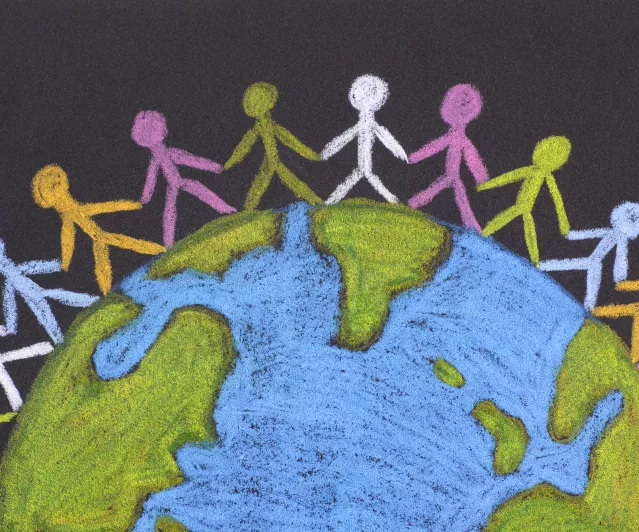
What is the motivation for the project?
Educational inequity is a persistent challenge across the globe. Due to its relevance, access to ‘inclusive and equitable quality education’ was included as one of the Sustainable Development Goals (SDGs) ratified by the United Nations General Assembly. Inequities in education often become evident in the transition processes that provide students access to different school forms and academic tracks, the most significant being the transition from primary to secondary education. The GlobalEquitEd project researches the role of linguistic and cultural diversity in moments of assessment that can lead to educational inequity.
What issues does the project address?
In countries with early academic tracking, such as the Netherlands, educational inequity also often becomes evident in the transition processes that provide students access to different school forms and academic tracks, the most significant being the transition from primary to secondary education (Onderwijsraad, 2017). Concretely, while pupils from monolingual families with high socio-economic background are disproportionately more represented in academic school tracks, pupils from linguistic and cultural minorities and with a low socio-economic background are over-represented in vocational tracks (Van de Werfhorst & Van Tubergen., 2007). The project provides teachers with a digital tool (toolkit) to promote equity in assessment of linguistic and culturally diverse pupils in their transition from primary to secondary education.
Project team
The team is composed of lecturers in the international teacher training education for primary schools (iTEPs) in Meppel, researchers from the research group of Multilingualism and Literacy and students of the teacher training programs of the iTEPs and the University of Amsterdam. The project was integrated in the curriculum of the pre-service students attending the iTEPS of the NHL Stenden University of Applied Sciences and the teacher training program of the University of Amsterdam between March and December of 2021.
The concrete team members are:
- Joana Duarte, professor for Global Citizenship at the University of Amsterdam and for Multilingualism and Literacy at the NHL Stenden University of Applied Sciences
- Ton Gelmers - location manager ITEPS/NHL Stenden University of Applied Sciences
- Robin Ulster - lecturer in Inclusive Education and English as an International Language, ITEps/NHL Stenden University of Applied Sciences
- Natalie Shaw - lecturer in Education Studies and Year coordinator ITEps/NHL Stenden University of Applied Sciences
- Thomas Gitopoulos - Lecturer in Democratic Citizenship ITEps/NHL Stenden University of Applied Sciences
- Marcel Haagsma - Lecturer in Democratic Citizenship ITEps/NHL Stenden University of Applied Sciences
- James Denby - lecturer in Inclusive Education and English as an International Language, Year Coordinator ITEps/NHL Stenden University of Applied Sciences
Project approach
The project draws on a framework at the intersection between research on:
- structural inequalities inherent to educational systems
- the quality of teaching of linguistic and cultural diverse pupils
- issues relating to asymmetries in student assessment
The current project developed and evaluated a Toolkit for critical global citizenship education, inclusion and equity in educational transitions (GlobalEquitEd), allowing (pre-service) teachers to acknowledge and draw upon their linguistically and culturally diverse pupils’ specific ‘funds of knowledge and of identity’ (Volman & ’t Gilde, 2020), following emancipatory and critical models of global citizenship education. We concretely explored how engaging in forms of critical citizenship education (Andreotti, 2006) in combination with exploring approaches towards culturally (and linguistically) responsive pedagogies (e.g. Gay, 2000; Hollie, 2017) affects the educational pathways of linguistic and culturally diverse pupils in their transition from primary to secondary education.
Key results
The GlobalEquited project developed and evaluated the Toolkit for critical global citizenship education, inclusion and equity in educational transitions (GlobalEquitEd), allowing (pre-service) teachers to acknowledge and draw upon their linguistically and culturally diverse pupils’ specific ‘funds of knowledge and of identity’ (Volman & ’t Gilde, 2020), following emancipatory and critical models of global citizenship education. We concretely wish to explore how engaging in forms of critical citizenship education (Andreotti, 2006) in combination with exploring approaches towards culturally (and linguistically) responsive pedagogies (e.g. Gay, 2000; Hollie, 2017) may affect the educational pathways of linguistic and culturally diverse pupils in their transition from primary to secondary education. The toolkit will be launched in September 2022, during the iTEPs conference.
Below is a video demonstration of the toolkit:





